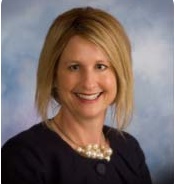Leslie Marsh, RN, MBA, MSN serves as Chief Executive Officer for Lexington Regional Health Center
On April 11th, Leslie will speak on a panel at Becker's Hospital Review 9th Annual Meeting. As part of an ongoing series, Becker's is talking to healthcare leaders who plan to speak at the conference, which will take place April 11-14, 2018 in Chicago.

To learn more about the conference and Leslie's session, click here.
Question: Describe one of your best colleagues. What it is that person does/brings that makes them indispensable to your organization?
Leslie Marsh: It is impossible for me to pick just one colleague because I am lucky enough to be surrounded by committed, bright and passionate team members. My colleagues are kind, hard-working, accountable, compassionate and interested in creating a culture where all people are able to succeed. They 'seek first to understand' when listening to others express a point of view, particularly if that idea is in opposition to an idea they proposed. They share traits of exemplary leaders serving as role models who are unafraid to challenge processes, set and meet goals, and engage in critical conversations when necessary.
These leaders are vital to our organization's operations. They work tirelessly and capably. They share a wide array of interests and strengths, and the team, the organization and the community we serve all benefit. They are integral to day-to-day operations, execution of strategy and in creating and maintaining Lexington Regional Health Center's culture. Our health center is not defined by its physical footprint but rather by the shared commitment to the mission and vision expressed every day in thousands of ways by my team members.
Q: What change in reimbursement is your organization feeling most acutely, and how is it affecting your two to five-year strategic plan?
LM: We are in the midst of an ongoing economic transformation of healthcare, so there is no shortage of financial challenges for our health center and for my community. Our un- and under-insured population accounts for 34 percent of [our] total payer mix. Payers are requiring more information prior to any authorization of treatment and subsequent payment. Even after a substantial investment in additional staff devoted to revenue cycle processes, we continue to see increasing denials and contractual adjustments. Most existing insurance plans have very high deductibles — in a rural healthcare setting, this disproportionately impacts bad debt, contractuals, accounts receivable, cash and other financial metrics. Thus, the current external regulatory environment, increasing financial constraints from all payers and our community's low socioeconomic demographics are all significantly [our] impacting strategic planning.
Q: How do you see the barrier between competitors and collaborators changing?
LM: Low volume is a terrible challenge for all rural facilities. Every patient expects access to the latest medical technology, regardless of the cost per use. An individual small hospital is at a disadvantage. The path forward in meeting the healthcare needs of rural communities begins with the development of a robust data analytics approach. Decision makers need to make evidence-based choices on facility operations, service line growth including specialty services, inventory control and ultimately patient care management. For small hospitals, the problem is a lack of resources [that includes] the defined skill sets required for optimum operations. The difficulty in recruiting IT professionals into rural areas is a perfect example.
Individual hospitals cannot magically increase their population base or service area, so the best option available is to create meaningful networks, which allow for an increase in scale. Horizontal cooperation among small hospitals allow for gains in bargaining power, better access to scarce specializations and ultimately better service to underserved rural communities.